Description
Read the full Starting Grant approved in July 2018 (Starting Grant_2018_B2_RIVERS_Grant Agreement 804003).
Rivers engages with one of the most pressing questions of this century: the relationship between humans and “Nature”.
Water is a unique resource. Without water there is no life. A global water crisis and climate change is threatening our planet, but RIVERS does not take for granted what water is.
Water conflicts across the world are bringing to the fore fundamental challenges regarding the anthropocentric boundaries of the human rights paradigm. Worldwide, indigenous peoples are mobilising against the neoliberalisation of nature, demonstrating radically different ways of being knowing and existing .
At the same time recently Rivers in New Zealand, Ecuador, Colombia, India, Argentina and Australia have obtained the status of living entities and legal personality in innovative legal decisions enshrined in laws and rulings of domestic high courts.
Against this background, Rivers’s overarching research question is: To what extent can international human rights law come to grips with plurilegal water realities?
Rivers will pioneer new ways of rethinking the modern assumptions and conceptualisations about the culture-nature divide that underpin the dominant human rights paradigm by providing ground-breaking empirical data and innovative comparative and interdisciplinary insights.
Objectives
Rivers has two intertwined core objectives:
- analysing different ways of knowing and relating to water and life among indigenous peoples and their understanding of its (potential) violation by extractive projects;
- discussing the contributions, challenges and pitfalls of interlegal translation of differing water natures in plurilegal encounters at domestic and international levels.
Through the lens of legal pluralism, Rivers will foreground competing political and legal water realities that interrogate dominant understandings of the modern world and everyday power relations about natural resources, development and territory.
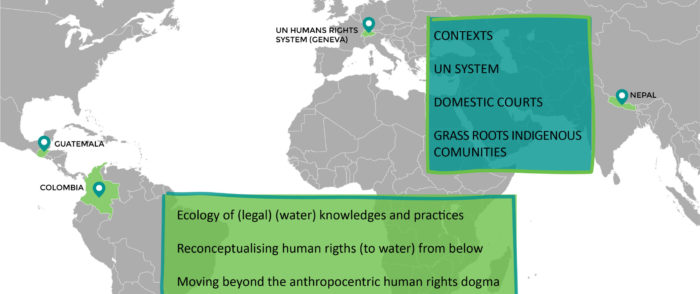
The ground-breaking nature
The unique bottom-up and interdisciplinary research of Rivers critically elucidates possible ways forward for an urgent paradigm shift beyond the dominant modern culture-nature and human and non-human assumptions of the human rights framework.
Rivers builds this legal ethnographic landscape within the context of large-scale natural resource exploitation projects (extractivism), which have destructive effects on local livelihood and water sources, disproportionally affecting ethnic, indigenous and afro-descendent groups.
Rivers promotes new approaches regarding three core political and scientific controversies:
Ecology of (legal)
(water) knowledges
& practices
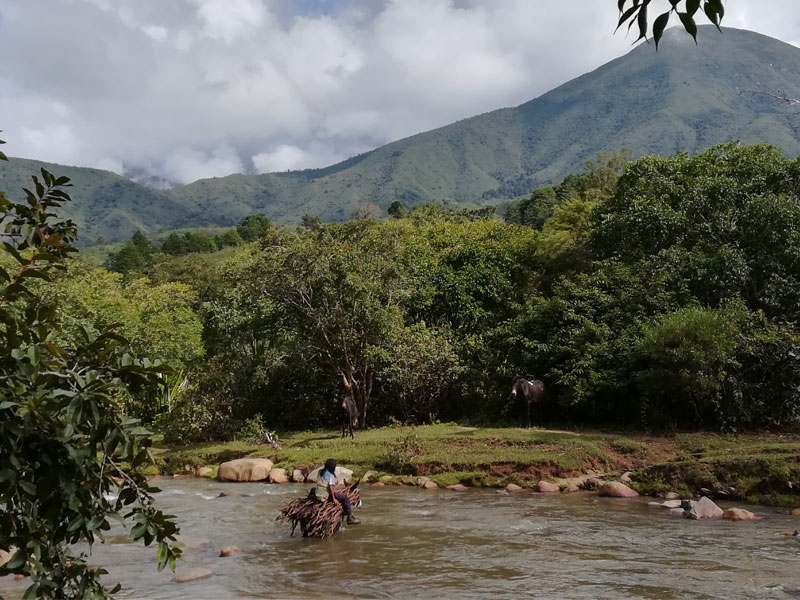
Nabusimake, Sierra Nevada, Colomcia, 2017 LViaene
Rivers recognises the existence of a plurality of ways of knowing and relating to water and aims to engage in broader epistemological and ontological disputes among mainstream legal perspectives and indigenous knowledges about human-nature relationships.
Reconceptualising
human rights (to water)
from below
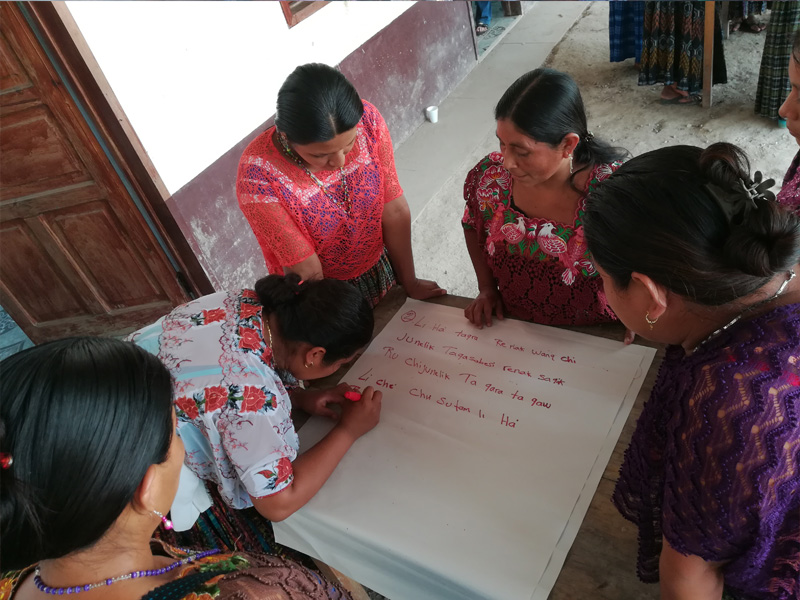
Workshop maya q’eqchi’ women about water, Guatemala, 2017, ©LViaene
Rivers questions the mainstream interpretation of the human right to water, rooted in the Western modern liberal worldview.
Rivers‘s innovative bottom-up approach will reveal other plurilegal relationships and water realities and highlight the importance of a richer understanding of the application of the key human rights principles of interdependence and indivisibility, transcending the culture-nature divide.
Moving beyond
the anthropocentric
human rights dogma
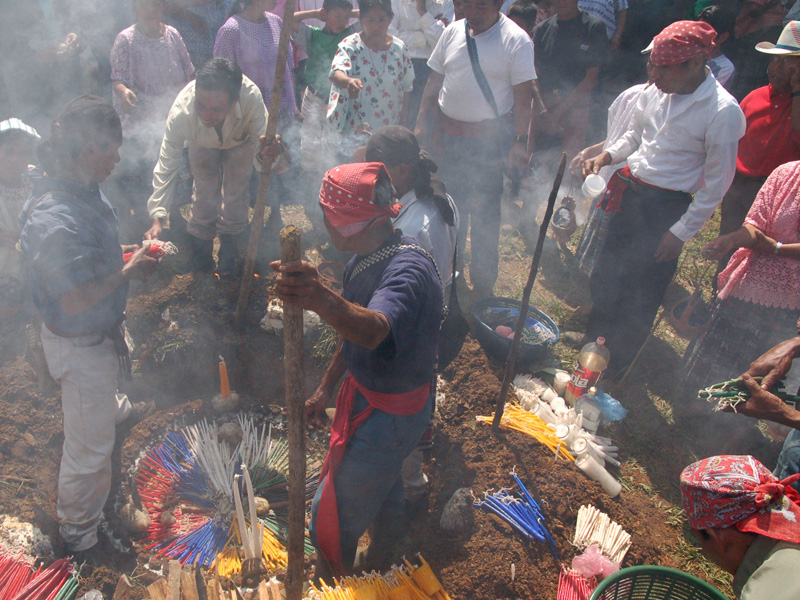
Maya q’eqchi’ mayejak, Guatemala, 2007, ©LViaen
Rivers will establish a dialogue between mainstream human rights theory and emerging theories and conceptual frameworks that challenge the human-centred nature of the dominant human rights framework, such as earth jurisprudence, Rights of Nature and the international debates to grant constitutional rights to nature.
RS-I: Indigenous visions/practices: beyond water as a natural resource and a human right
This RS seeks to demonstrate that dialoguing with ontologically different concepts of water will pave the way for rethinking the human right of water and human rights more broadly.
See more
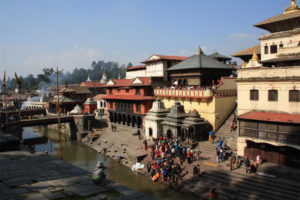 Multiple and contested meanings attached by Latin American and Asian indigenous peoples to rivers will be examined.
Multiple and contested meanings attached by Latin American and Asian indigenous peoples to rivers will be examined.
WP-A will unveil and grasp indigenous water knowledges and ontologies at the grassroot level of indigenous communities in Guatemala and Nepal.
Some of the guiding questions of WP-A are:
- How do diverse indigenous peoples perceive and relate to water in daily practice?
- How does water and the river speak in the midst of socio-political conflicts provoked by extractivism?
- To what extent does indigenous knowing and relating to water contest the conventional interpretation of the human right to water?
WP-B looks into interlegal translation in court and understand the role of anthropological expert testimonies.
WP-B will tackle questions as:
- Companies are non-humans that have legal personality and are represented by humans in court, but to what extent can knowledge about rivers and water based, for example, upon dreams, fire ceremonies or ayahuasca rituals, actually be heard in court?
- To what extent can anthropologists counter-analyse orthodox legal ways of knowing water with indigenous counter-hegemonic ways of knowing and relating to water in the courtroom?
RS-II: UN human rights system: toward counter-hegemonic water knowledge and norm production
As international human rights law is developed and reinforced by the UN human rights system, Rivers aims in this RS to empirically scrutinise encounters of hegemonic and counter-hegemonic understandings of the human right to water and human rights broadly within this universal protection system.
See more
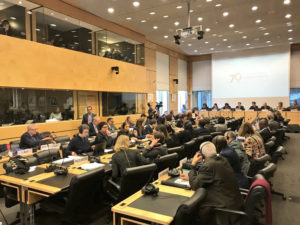
WP-C looks into human rights treaty bodies: water knowledge and norm production.
Here Rivers engages with international norm-setting within key UN spaces, such as the Committee on Economic, Social and Cultural Rights (CESCR), the Special Rapporteur on the human rights to safe drinking water and sanitation and the Special Rapporteur on human rights and the environment.
This WP-C will focus on questions as:
- How do people think about the right to water and nature in international human rights law settings?
- To what extent are indigenous water conceptions recognised and incorporated in the development and interpretation of the human right to water?
WP-D will examine the role of universal human rights and international indigenous knowledge brokers. Rivers will focus on the impact and limitations of the work of independent indigenous international experts, such as the Expert Mechanism on the Rights of Indigenous Peoples and Special Rapporteur on the Rights of Indigenous Peoples, as knowledge/ontological knowledge brokers or diplomats within the UN human rights system.
One of WP-D main research questions here is:
- What have been their main obstacles, success factors and lessons learned in procuring an international norm-making space which recognises counter-hegemonic human rights views?
Empirical dialogues
At the grassroot level of indigenous communities, water controversies shows that human rights remain entrenched in modern assumptions about nature/culture and human/non-human divides.
Rivers will engages with the theoretical advances in the field of human rights and cultural pluralism and decolonising theories of human rights.
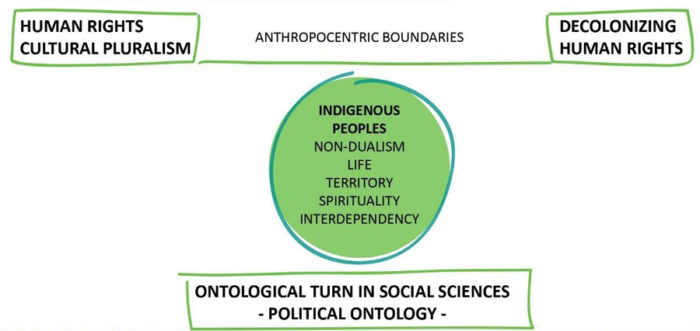
But this project wants to go beyond the theoretical breakthrough in both fields because these water conflicts bring to the fore competing views about how the world is made, creating legal and anthropological discomfort.
Therefore, Rivers will dialogue with the emerging project of ‘political ontology’ within the contested ontological turn in social sciences.
Research methodology
Rivers is grounded in empirical and interdisciplinary research crosscutting the fields of human rights and legal anthropology.
Inductive legal anthropological approach
Rivers is based on a qualitative research design marked by an inductive legal anthropological approach which aims to generate in-depth understanding of indigenous and international legal perceptions of water and how international human rights can deal with plurilegal water realities.
Multi-sited research
Rivers applies multi-sited research which allows the tracing and analysis of common, connecting and divergent water conceptions and practices across global-local and state places.
The fieldwork sites are:
- grassroots level of indigenous communities in Guatemala and Nepal affected by extractive development projects
- state level in Colombia and Nepal: judicialisation processes relating to the selected extractive projects
- international level UN human rights system (Geneva): CESCR and Human Rights Council (UN treaty bodies) and EMRIP and Special Rapporteurs on the Rights of Indigenous Peoples and the Right to Water and Sanitation (UN Special Procedures).
Participatory Collaborative Research
Rivers recognises that academic research is a site of epistemological and political struggle between ways of knowing of the “West” and the ways of resisting of historically discriminated and silenced “O/others”. This project wants to contribute to the necessary process of decolonising research methods, and wants to support the participating indigenous peoples to reclaim control over their own ways of knowing, being and living. Rivers will undertake participatory collaborative research methods, amongst others community collaborative documentaries about indigenous water knowing, living and being and human rights.


